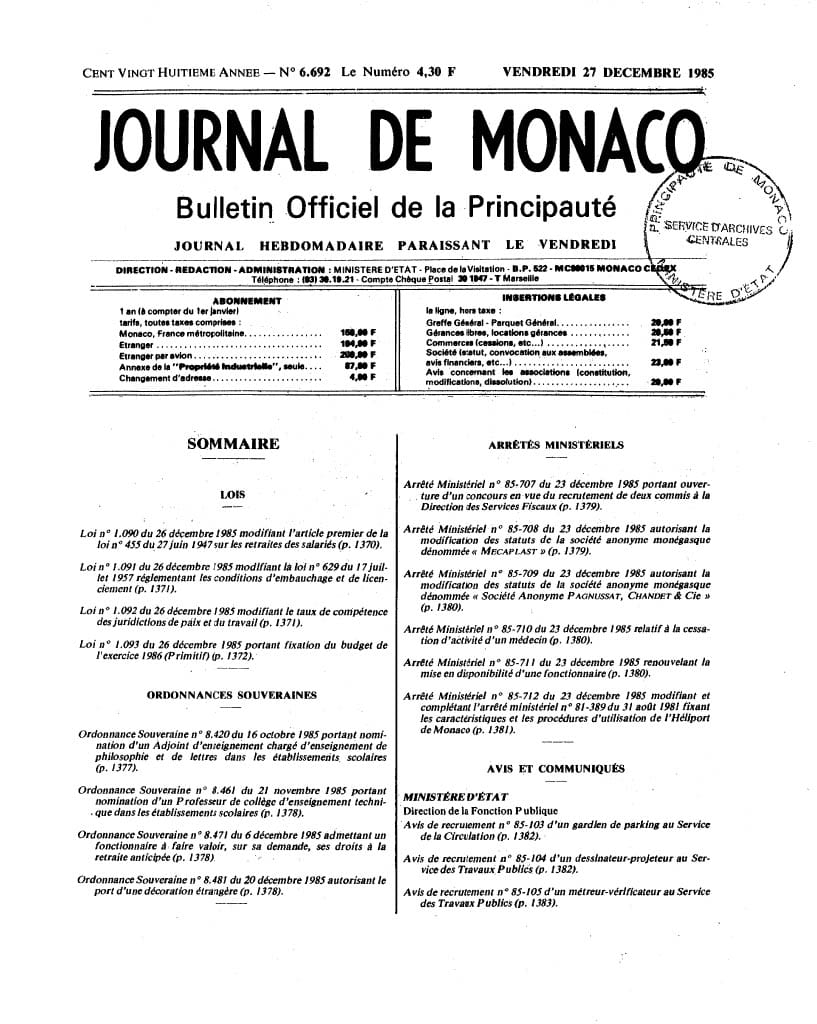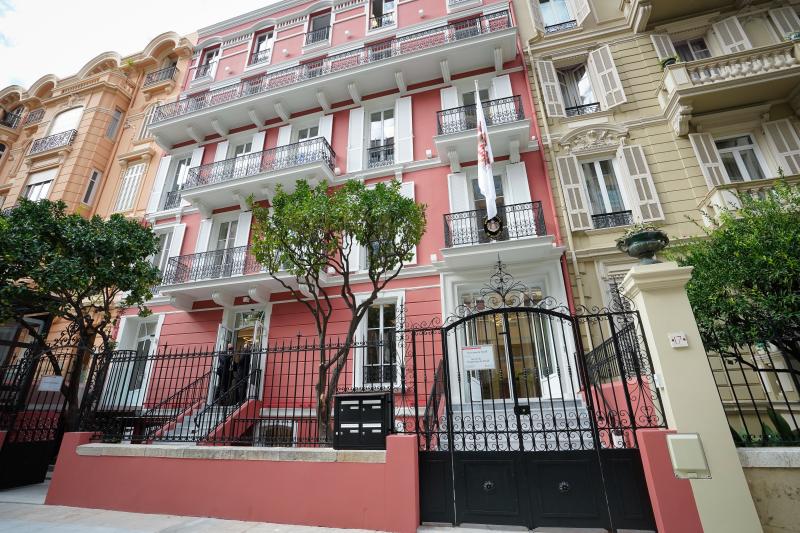The Monegasque labour market recorded 65680 jobs (private + public sectors) at the end of 2024, a significant increase compared with previous years. This momentum is reshaping HR challenges for companies, which must navigate a regulatory environment that is unique to the Principality.
Recruiting in Monaco requires a solid understanding of a strictly regulated hiring priority system, governed by two key legislative texts: Law No. 629 of 1957 and Law No. 1.091 of 1985.
For HR Directors and business leaders operating in Monaco, compliance with this framework is non-negotiable.
Regulatory Foundations: Laws No. 629 and No. 1.091
The legal framework governing recruitment in the Principality of Monaco is built on two major legislative texts that structure the entire hiring proces
Law No. 629 of 17 July 1957 forms the historical basis of this regulation. Adopted during a period of economic expansion, it aimed to protect employment for nationals while still allowing companies to recruit international talent needed for the country’s development. This law notably established the requirement for a work permit for any foreign national wishing to hold a private-sector job in Monaco, as well as the obligation to declare job vacancies in advance to the Employment Office.
Law No. 1.091 of 26 December 1985 complements and modernises this framework. It defines a five-tier hierarchy of employment priority categories, strengthens employer obligations, and introduces specific provisions regarding dismissals. The law was amended in 2019 (Law No. 1.481) to reflect evolving work models, including the rise of teleworking.
Recent developments highlight the regulatory system’s adaptation to labour market changes. Since 2019, work permit applications must specify any teleworking activity and its designated locations. At the same time, administrative processes have been increasingly digitised: in November 2024, the Employment Office launched a new employer portal via MonGuichet.mc, streamlining the submission of job offers and enabling real-time tracking of applications.
These regulatory principles serve a dual objective: protecting local employment while ensuring that Monegasque companies can access the skills they need. With 6,355 employers registered in the private sector at the end of 2024, mastering this framework has become essential for any organisation aiming to recruit efficiently and in full compliance.

Employment Priority Order: Who Must Be Hired First in Monaco?
Understanding the employment priority order is essential for anticipating recruitment timelines and adjusting HR strategy accordingly. Article 5 of Law No. 629, as amended by Law No. 1.091, establishes a strict five-tier hierarchy that the Employment Office must follow when reviewing applications.
Category 1 – Monegasque nationals benefit from absolute priority
For this category, no prior hiring authorisation is theoretically required. The employer must simply submit a written declaration to the Employment Office once the employee begins working. This simplified procedure reflects the Principality’s commitment to prioritising access to employment for its nationals.
Monegasque citizens may register with the Employment Office through a dedicated process, including when they are already employed but seeking career advancement.
Category 2 – Foreign nationals married to a Monegasque citizen and direct descendants of Monegasque nationals
Two conditions must be met: the marriage must be valid with a Monegasque national who has retained their nationality, and there must be no legal separation. This category recognises family ties with the Principality as a privileged factor for professional integration.
Category 3 – Foreign nationals domiciled in Monaco who have already held employment in the Principality
This provision supports the retention of talent already established locally and familiar with the Monegasque labour market. Eligibility is based on effective residence in Monaco and previous professional experience in the Principality, with no minimum duration specified by law.
Category 4 – Residents of neighbouring municipalities
This category acknowledges the geographical and economic reality of the cross-border employment area. Candidates must prove residence in one of these municipalities (Cap d’Ail, La Turbie, Beausoleil, Roquebrune-Cap-Martin) as well as prior professional experience in Monaco.
Category 5 – All other candidates
These candidates may be hired only when no applicant from the first four categories has been selected by the employer. In this case, a hiring authorisation may be issued once the Employment Office validates the employer’s choice.
Mandatory Procedure:
Step-by-Step Hiring Authorisation Process
The hiring procedure in Monaco follows a strict chronological process overseen by the Employment Office. Mastering each step helps prevent administrative delays and ensures full legal compliance.

Step 1 – Declaration of the Job Offer to the Employment Office
Every job offer must be declared to the Employment Office before any recruitment action takes place. Since November 2024, this declaration must be submitted via the new employer portal available on MonGuichet.mc. Employers may also use the paper form provided by the Employment Office.
Mandatory information includes: a detailed job description, required skills, contract type (permanent, fixed-term, part-time), proposed remuneration, and preferred start date. A confirmation of submission is sent by e-mail within 24 hours.
Step 2 – Presentation of Priority Candidates
Within four full days of the job offer being filed, the Employment Office sends the employer the priority candidates matching the required profile. The employer must review these applications diligently, as failure to respect the priority order may result in the refusal of the hiring authorisation.
If no priority candidate is presented within this timeframe, or if the proposed candidates do not meet the necessary requirements, the employer may then propose their own candidate. The employer retains full decision-making authority, provided the legal framework is respected.
Step 3 – Request for Hiring Authorisation and Work Permit
Once the selected candidate has been validated by the Employment Office, the employer receives by post the form titled “Demande d’autorisation d’embauchage et de permis de travail.” This document must be accurately completed and signed by both employer and employee. Required supporting documents vary depending on the candidate’s nationality and status: an identity card or passport for EU nationals, and a valid residence permit authorising employment (issued by the Alpes-Maritimes Prefecture) for non-EU nationals.
The full application must be submitted to the Employment Office along with a €5 stamp duty. Booking an appointment online via MonGuichet.mc is strongly recommended to avoid additional delays.
Step 4 – Mandatory Checks and Validations
The work permit can only be issued once several controls have been completed. The “Médecine du travail” assesses the candidate’s medical fitness for the position. The “Direction de la Sûreté Publique » issues an opinion as part of national security requirements.
These cross-checks ensure the legitimacy and compliance of the recruitment. Processing times vary depending on the complexity of the application and the candidate’s nationality: between two and four weeks for EU nationals, and up to six weeks for non-EU nationals requiring additional verification.
Step 5 – Issuance of the Work Permit and Social Registration
Once the validated application is filed, the Caisses Sociales de Monaco (CCSS) issue a provisional registration certificate, allowing the employee to begin working. This document includes the social security number that will identify the employee throughout their career in Monaco.
In parallel, the definitive work permit is issued, specifying the employer, authorised job role, and—where applicable—teleworking arrangements.
Registration with the social security bodies (CCSS for health and social benefits, CAR for retirement) activates entitlement to social coverage. Registration takes effect on the employment start date indicated on the form and cannot be backdated to a date prior to the submission of the application.
This five-step process forms an essential administrative pathway. Any employment undertaken without compliance exposes the employer to criminal penalties and the obligation to immediately terminate the professional relationship.
Rights and Obligations of Employers in Monaco
The Monegasque legal framework places significant responsibility on employers throughout the recruitment process. A clear understanding of these obligations helps prevent errors that could lead to substantial legal and financial consequences.
Declaration and Compliance Obligations
All employers, regardless of the size of their organisation, must systematically declare every hire to the “Service de l’Emploi” (Employment Office). This requirement applies even when hiring a Monegasque national, although the procedure is simplified (a simple declaration upon the employee’s start date, with no prior authorisation required). Strict compliance with the legally established priority order is non-negotiable: employers may not reject a priority candidate without an objective justification based on the skills or experience required for the role.
Any changes occurring during the employment contract trigger new administrative formalities. Any change of employer, job, profession, or the introduction of teleworking requires submitting a request to amend the work permit. This ensures that the employee’s administrative status remains consistent with their actual professional situation. Requests for amendments or renewals are made using a simplified form available from the Employment Office.
Sanctions in Case of Non-Compliance
Article 10 of Law No. 629 provides for criminal penalties in the event of non-compliance with legal provisions: imprisonment ranging from six days to one month, and/or a fine. Beyond criminal sanctions, the practical consequences are particularly dissuasive. If the competent authorities issue an unfavourable opinion regarding the employment, the employee’s registration is immediately invalidated. The employer is then required to terminate the professional relationship with the concerned employee, even if they have already begun working. This situation can lead to administrative complications, additional costs, and may negatively impact the employer’s reputation with the Employment Office for future recruitment processes.
Employers remain solely responsible for completing all hiring and registration formalities. This full and exclusive responsibility underscores the need for strict administrative diligence—or the use of specialised support—to secure each stage of the process.
Specific Cases and Special Procedures
Certain recruitment situations require a tailored approach or benefit from special procedures. Understanding these specific cases helps optimise administrative steps according to the context of the hire.
The recruitment of candidates from outside the European Union who do not hold a French residence permit authorising them to work requires an anticipated and preliminary assessment. The employer must contact the Head of the Employment Office directly, via emploi@gouv.mc, to evaluate the feasibility of the hiring project.
The hospitality sector benefits from a simplified procedure for the recruitment of extra staff. A specific form, “Hiring Authorisation Request – Extra Hotel Staff,” enables faster processing to meet temporary reinforcement needs. This administrative flexibility acknowledges the particular characteristics of a sector subject to significant seasonal fluctuations.
Private individuals employing domestic staff (housekeeper, driver, cook, house employee, governess, gardener, etc.) may hire without submitting a prior job offer. They submit their chosen candidate directly to the Employment Office using a dedicated form or the online service “Hire Domestic Staff.” This exception reflects the unique nature of domestic employment, where trust and personal suitability are paramount.
Provisions relating to teleworking were integrated into Law No. 629 in 2019. Work permit applications must now indicate whether telework will be performed and specify the locations where it will take place. The implementation or termination of telework during the execution of an employment contract requires submitting a request to modify the work permit. This development recognises new forms of work organisation while maintaining administrative oversight.
Finally, Article 3 of Law No. 629 provides for emergency situations. In cases of urgency recognised by the Employment Office, the usual procedure may be bypassed with prior approval. The employer may then hire, for a limited duration, the staff they urgently lack. This exceptional flexibility allows businesses to respond to critical needs without compromising the overarching principles of employment priority.
Administrative Timelines and Pitfalls to Avoid
Field experience shows that most recruitment difficulties in Monaco stem from five recurring mistakes — all of which can be avoided with proper anticipation.
Anticipating administrative timelines is the first key to success. These multi-week delays include the four full days allocated for priority candidates to apply, administrative processing, medical examinations, and security checks. Depending on the period, timelines may be extended by an additional one to two weeks.

Mistake #1 – Failing to declare the job opening early enough
Engaging in detailed discussions with a candidate before declaring the job opening to the Employment Service exposes the employer to the risk of being unable to hire if a priority candidate later comes forward. This mistake often results in delicate situations: unfulfilled promises to the selected candidate, wasted time in the selection process, and damage to the employer brand. Best practice is to file the job opening as soon as the hiring need is identified, even before sourcing candidates.
Mistake #2 – Underestimating administrative timelines
Promising a start date without factoring in administrative delays is the most common error. A non-EU candidate must first obtain a French residence permit authorizing them to work before beginning the Monegasque procedure, which can extend the total timeline to more than three months. Systematically planning for a minimum of three to six weeks, depending on the profile, helps prevent delays that could disrupt operations.
Mistake #3 – Overlooking the candidate’s priority category
Identifying the candidate’s priority category early on allows for better planning and anticipation of potential obstacles. A highly qualified Category 5 candidate can only be hired if no candidates from higher categories match the requirements. Verifying priority status during the initial discussions prevents investing time in a recruitment process that may later be blocked administratively.
Mistake #4 – Incomplete or incorrect documentation
An incomplete file or one containing errors leads to administrative back-and-forth that significantly extends timelines. The checklist of required documents varies depending on the candidate’s profile: Monegasque national: identity card, EU national: ID card or passport, Non-EU national: residence permit authorizing work, Resident of a neighbouring municipality: recent proof of address + proof of previous employment in Monaco
Preparing a complete file from the very first submission provides a substantial time-savings.
Mistake #5 – Ignoring changes occurring during the employment contract
Any significant change during the contract requires a new administrative request. An employee who changes employer — even within the same group — must obtain a new work permit. Likewise, implementing telework or changing the type of job requires a modification request. Overlooking these formalities exposes the employer to the penalties set out in Article 10 of Law No. 629 and may result in the cancellation of the work permit.
How Nexus HR supports you through these administrative procedures
Navigating Monaco’s regulatory framework requires an in-depth understanding of procedures and a thorough command of administrative nuances. Thanks to our strong market expertise, we support companies efficiently throughout the entire process — from standard cases to highly specific situations, including niche profiles in sectors such as yachting or family offices, as well as urgent cases requiring accelerated processing.
Our support covers the full workflow: declaring the job opening, preparing the work-authorisation application file, managing administrative follow-up with the Service de l’Emploi, coordinating with the CCSS for registration, and finalising the work permit. This end-to-end assistance frees HR Directors and executives from time-consuming administrative tracking, allowing them to focus on what truly matters: assessing candidates and onboarding new employees.
Beyond the time savings, our support provides valuable legal security. Each application strictly complies with the legal framework, eliminating the risk of authorisation refusals or administrative penalties. Our Standard, Premium and Start-up packages adapt to every need, from occasional optimisation to fully tailored, comprehensive support.
Conclusion
Monaco’s regulatory framework protects local employment through a strict priority system established by Laws No. 629 and 1.091, which structure the entire labour market of the Principality. This specific organisation requires employers to understand the five priority categories and comply with a multi-step administrative process overseen by the Employment Service.
Regulatory compliance is not a constraint but an opportunity: it provides legal security in recruitment, prevents administrative and criminal penalties, and ensures a smooth onboarding of new employees. Anticipating timelines of three to six weeks depending on the profile, systematically declaring job openings in advance, verifying candidates’ priority category, and submitting complete application files all enable efficient recruitment in full compliance with the law.
In a constantly growing labour market (65680 jobs as of late 2024), mastering recruitment regulations has become a competitive advantage for attracting and integrating top talent. Companies that invest in this administrative expertise, internally or through specialised support, optimise their hiring timelines and strengthen their employer attractiveness.
Need support with your recruitment-related administrative procedures?
Contact Nexus HR to discover how we can simplify your hiring processes in the Principality and allow you to focus on your core business.
Sources
- Loi n°629
- Recruter du personnel – MonEntreprise.gouv.mc
- IMSEE – Emploi
- Haut-Commissariat – Vérifications de police
- S’inscrire au Service de l’Emploi
- Demande d’autorisation d’embauchage
- CCSS – Immatriculation des salariés
- Embaucher du personnel de maison
Photo credit: Pixabay, Direction de la Communication – Monaco
